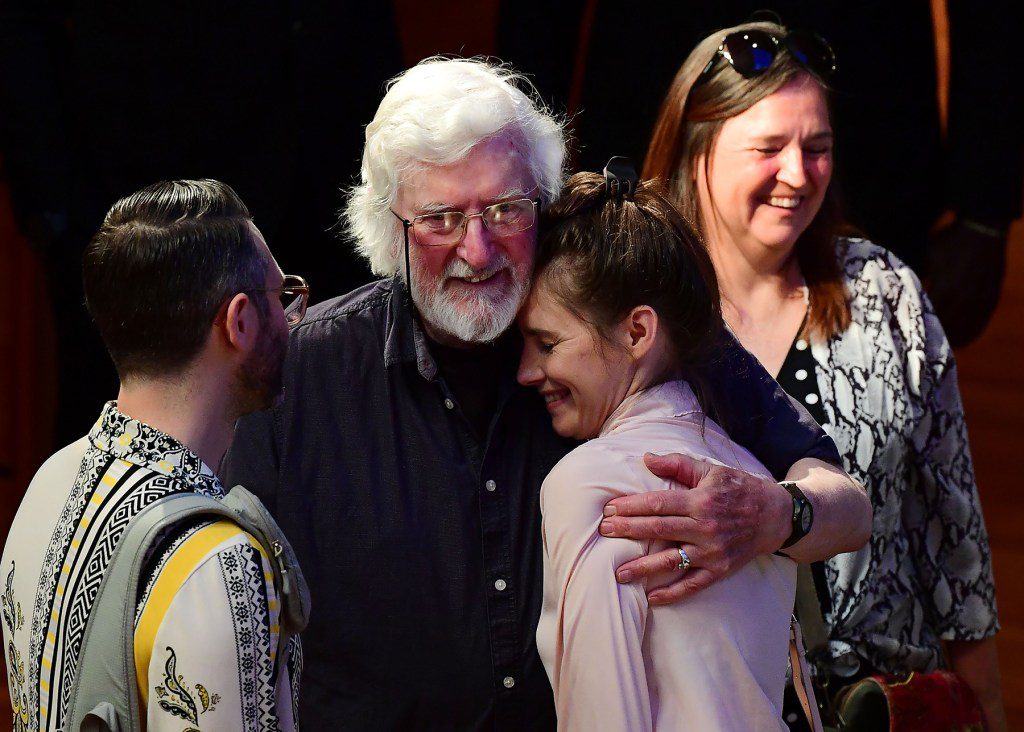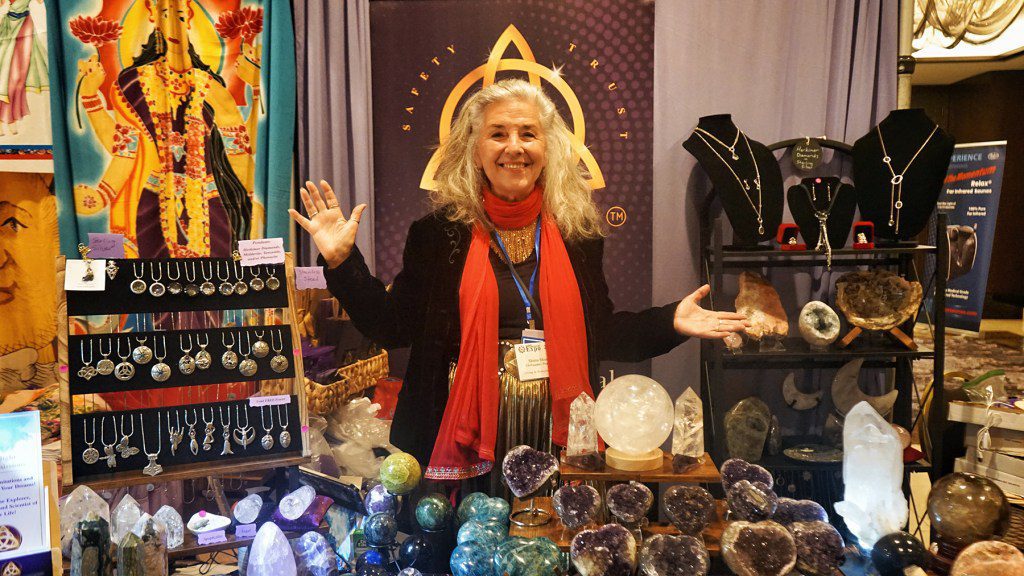Amanda Knox May Never Be ‘Free.’ She’s Learning to Live With That
It’s been 14 years since Amanda Knox was released from an Italian prison, but rarely in that time has she truly felt free. The 37-year-old exoneree and activist might be lawfully permitted to move about in her daily life, which currently comprises work as a journalist, public speaker, and podcaster, and raising two young children with her husband, Christopher Robinson. But Knox, who was wrongly imprisoned during her 2007 study abroad semester in Perugia, Italy, twice convicted, and ultimately exonerated for the murder of her housemate Meredith Kercher, may never climb out from under the yoke of public opinion.
“I don’t have the answers to escape suffering, to find closure, to heal trauma,” she writes in her eloquent and heartbreaking new memoir, Free: My Search For Meaning (out March 25 via Grand Central Publishing). “I don’t know how to truly be free. But I know how to try.”
“Trying” takes on many forms across Free. In Perugia’s Capanne prison, as Knox recalls in her new book, liberation could be as simple as a shared meal among her fellow inmates, or running laps around the building’s small courtyard. After she was exonerated in 2011, freedom could resemble a typical 20-something’s journey, with a cross-country move to New York City and ill-advised romantic relationships. More recently, Knox has found deliverance in her decision to reach out to, and eventually befriend, Giuliano Mignini, who prosecuted her case.
Knox’s unlikely friendship with Mignini is what initially led her to Free. “I use writing to process my thoughts and my feelings and my experiences. It’s just what I do,” Knox tells Rolling Stone. “But bringing this book together really came on the heels of going to Italy to visit my prosecutor. I really did come away from that experience feeling like, for the first time, I had done something to define myself that wasn’t just reacting to what other people were saying about me. It was the story of self-definition.”
Nightmare in Italy
Outside opinions have plagued Knox since the beginning of her ordeal in 2007. That fall, a 20-year-old Knox was beginning her semester abroad in Perugia, where she lived with three roommates, one of whom was Kercher, a British exchange student from the University of Leeds. When Knox arrived home the morning of Nov. 2 after spending the night with her new boyfriend, Raffaelle Sollecito, she discovered drops of blood in the bathroom and Kercher’s door locked, and immediately called the police. Kercher, 21, was later found dead in her bedroom with her throat slit and evidence of sexual assault present.
Over the next few days, police questioned Sollecito and Knox. Police abused Knox, who barely spoke Italian and did not have a translator or lawyer present — striking her across the face, preventing her from sleeping or speaking to her mother, and eventually coercing her into signing a written confession. Believing that everything would be over if she just signed the document, Knox unwittingly also implicated her then-boss, Patrick Lumumba, a local bar owner where Knox worked part-time. As soon as she realized what she’d done, Knox recanted her confession, but it was too late. Police arrested Knox, Sollecito, and Lumumba on Nov. 6, 2007. Lumumba was released after customers at his bar provided an alibi. Knox and Sollecito were to stand trial for murder.
Even at 20 years old, Knox felt convinced the truth would prevail. Surely the evidence, which definitively pointed to Rudy Guede, a neighbor of Knox and Kercher’s, would exonerate her. But the prosecution, led by Mignini, threw everything they had at her. Latching on to an old soccer nickname, “Foxy Knoxy,” the prosecution unfurled a sensationalized narrative where Knox, Sollecito, and Guede had allegedly orchestrated a violent and drug-fueled sex game gone wrong, resulting in Kercher’s death. In densely Catholic Italy, Knox was maligned in the tabloid media as a calculating and demonic sexual deviant.
“There was a long period of time where it felt like nothing I said mattered,” Knox says of her relationship with the media, which, even in the more forgiving United States, regarded her with skepticism. “That I didn’t matter. The message that was coming across to me was, ‘You belong in this little box that we have created for you, and anything that you say or do that goes against that, we are going to hold against you or suppress. You are our little sex demon icon.’”
Shaking ‘Foxy Knoxy’
After spending four years in prison, an appeal trial finally found Knox and Sollecito not guilty of murder in October 2011, and both were released. (Guede was convicted and has since served 13 years of a 16-year sentence.) But Knox had tremendous difficulty picking up where she left off in Seattle. She processed it some — in 2013, she published her first memoir, Waiting To Be Heard, detailing her ordeal — but as she recounts in Free, Knox was in serious legal debt and struggled to find a job, complete her college education, and date. It didn’t matter that she had been acquitted or written a bestselling book. Simply the fact that she had been convicted at all “turned my own name into a kind of prison,” she writes in Free.
Even worse, Knox’s name kept resurfacing in the international news. Even after being acquitted of Kercher’s murder in 2011, in March 2013 Italy’s final court of appeal overturned both Knox and Sollecito’s acquittals, and the Italian Supreme Court ordered them to stand trial again. (Knox did not go back to Italy for the trial.) In February 2014, Knox and Sollecito were again found guilty.
Ultimately, in March 2015, the Supreme Court of Italy overturned the convictions in a final decision. But Knox has not been able to completely escape the characterization as a “diabolical she-devil,” as one attorney called her, nor the very practical consequences of carrying a criminal record. (While Knox was exonerated of Kercher’s killing, an Italian court re–convicted her of criminal slander in June 2024, a decision Knox appealed. Italy’s Supreme Court upheld the ruling in January 2025.)
“The practical reality of being a convict and having to prove whether I’ve been rehabilitated from a crime I did not commit, having to do FBI Background checks and get fingerprinted, have character recommendation letters [written] are all things that follow me,” Knox says. “It’s in the public consciousness. I was very publicly accused and my reputation [was] utterly transformed in the most negative way, internationally. There’s no pretending that’s not a part of my reality.”
Meanwhile, in 2016, a Netflix documentary positioned Knox’s personality (and therefore her innocence) as being open to interpretation, with promotional billboards labeling photos of her with the words “monster” and “victim.” High-profile interviews with ABC’s Diane Sawyer and CNN’s Chris Cuomo went sideways as the anchors asked questions that fueled the audience’s doubt about Knox’s innocence. Knox views this portrayal as all being in service of a character, a projection, a fantasy — never a flesh-and-blood person.
“I have had to fight to be treated like a person instead of a product,” she says. “‘Foxy Knoxy’ was not a person. She was an idea of a person that people purchased over and over because it was morbidly satisfying. And also, you know, sexually titillating.”
A new chapter
While media partners might have their own agenda in hosting Knox, the person behind the product has evolved into a well-spoken advocate for the wrongly accused and convicted. Since her release from prison, Knox has found community in lobbying for criminal justice reform. In addition to exploring stories of personal growth and resilience via her podcast, Labyrinths, which she co-hosts with her husband, Knox sits on the advisory council for the Frederick Douglass Project for Justice and is on the Innocence Center Board of Directors.
“A lot of my advocacy work has to do with trying to make the criminal justice system and police work more transparent, so we can make better choices that lead to more just outcomes,” Knox says. “That includes banning police deception during interrogations and reporting all interactions with police officers, so people can understand what is psychologically happening between citizens and authority figures who have the right to take your freedom away. These are things that we don’t fully understand.”
Just as it traces her post-release reintegration into society, Free features nuanced discussions around how audiences process stories about trauma and victimhood. For instance, Knox introduces the “single victim fallacy.” Knox explains: “In a scenario where a crime occurs, there can be one true victim, and anyone else who potentially has a claim to victimhood is somehow taking away from another person’s claim to victimhood.” In Knox’s experience, the public views the “single victim” as Kercher, therefore Knox should not claim victimhood at the hands of the criminal justice system.
Knox is still living within this fallacy, much to her disappointment. “I understand that there is some confusion about where I begin and where Meredith [ends] because of how this story has unfolded,” she says. “But I remain my own person, and my experience matters. That’s why I’m choosing to share it, and it is not at Meredith’s expense.”
One of the bright spots in Free is Knox’s description of finding a close friend and ally in Monica Lewinsky, a fellow activist who also knows what it’s like to be raked over the coals of public opinion. “Monica is not just a friend who will make you a cup of tea and be there for you to talk to when you’re having a moment,” Knox says. The two are both co-executive producers on a forthcoming Hulu limited series about Knox’s ordeal, starring Grace Van Patten and Sharon Horgan as Knox and her mother, Edda Mellas
“She has paved a path of understanding between those of us who have been ostracized and villainized and the rest of the world. She’s really put herself out there to render an experience such as ours comprehensible to other people, so that I and people like me do not feel like we constantly have to explain ourselves before we have the opportunity to belong.”

Amanda Knox is embraced by Peter Pringle, the last men to be sentenced to hanging in Ireland, next to her now-husband, Christopher Robinson and her mother Edda Mellas, at the opening of the Criminal Justice Festival in Italy in 2019.
VINCENZO PINTO/AFP/Getty Images
Perhaps the most surprising friendship readers will read about in Free, however, is Knox’s friendship with Mignini. At first, Mignini did not plan to respond to Knox’s outreach but changed his mind after hearing her speak to the Italy Innocence Project in 2019. Her decision to write to Mignini did not come from a place of rage or self-righteousness. Knox simply did not want to subscribe to the two-dimensional characterization of her prosecutor as so many had done to her. “If I wrote Dr. Giuliano Mignini off as an evil, corrupt man — as most of my family, friends, and supporters had — I would learn nothing,” she reasons in Free. “Yes, he prosecuted the wrong people, flattening me into a cartoon villain for the world to judge. But I knew how wrong people were in their judgments of me, and I didn’t ever want to be that wrong about another person.”
Even though Mignini had pushed the narrative that she was a drug- and sex-crazed murderer, simply writing him off as “crazy” or ignorant wouldn’t answer her lingering questions about why she’d been imprisoned. “I did not go into communicating with Giuliano with the goal of becoming his friend or even of forgiving him,” Knox says. “The goal was to find some kind of solution to this very difficult, painful question inside of myself, which was simply, ‘Why?’… I was haunted by that question… I just was not willing to believe that [Mignini] was a psychopath or a monster—because that’s what people were calling me.”
Over the next few years, Knox and Mignini would periodically exchange letters. In lighter moments, they would bond over their mutual love of Lord Of The Rings. Other times, Knox would appeal to his sense of reason with the hope that he might finally admit he’d been mistaken in his prosecution. (The best he could do was admit there existed the possibility of his having been wrong.) They ultimately settled into a warm dynamic, with Knox describing Mignini in Free as adopting the role of “some kindly, distant uncle.”
In summer 2022, Knox decided to return to Perugia to meet face to face with Mignini. Traveling with her mother, husband, and baby daughter, Eureka, she also reunited with Sollecito, who has since moved to Milan. Each of these decisions — to revisit Italy, to build a relationship with her prosecutor, to keep speaking out at all when at many points the world told her to disappear — are Knox’s way of reclaiming her freedom. And that freedom, as she writes in her book, is partially found through knowledge, understanding, and maintaining a wide-open mind.
“I feel like a lot of people approach the world like it’s a department store,” Knox says. “They have an idea of what they want to get out of it, and they know exactly where to find it. Instead, it is like a thrift store. You are not going to find that little black dress that fits you perfectly that you are looking for. Instead, you are going to find a mushroom-shaped lamp that will go perfectly in your living room, and you didn’t know you needed it.”





